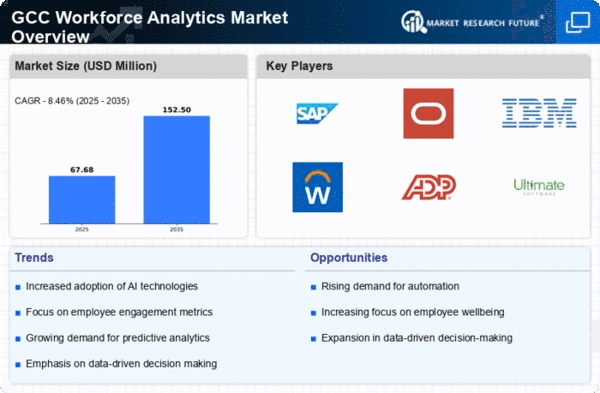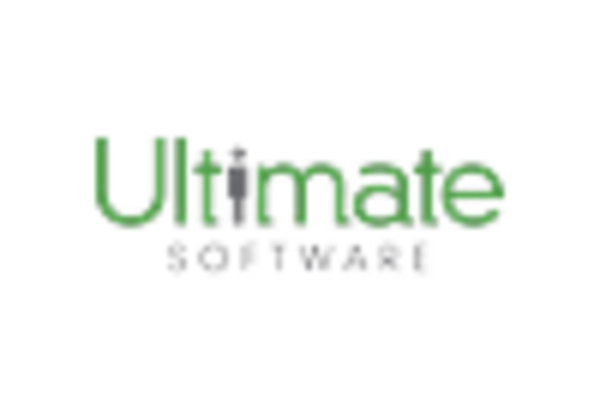Emphasis on Talent Management and Retention
In the GCC, there is a growing emphasis on talent management and retention strategies, which is significantly impacting the workforce analytics market. Organizations are increasingly aware that retaining top talent is essential for maintaining a competitive edge. As a result, they are investing in analytics solutions that provide insights into employee engagement, performance, and turnover rates. Reports indicate that companies utilizing workforce analytics for talent management can reduce turnover by up to 25%. This focus on employee retention is driving the demand for analytics tools that help organizations identify potential flight risks and implement effective retention strategies. Consequently, the workforce analytics market is likely to expand as businesses prioritize talent management.
Rising Demand for Data-Driven Decision Making
The workforce analytics market is experiencing a notable surge in demand for data-driven decision making across various sectors in the GCC. Organizations are increasingly recognizing the value of leveraging data to enhance operational efficiency and improve employee performance. According to recent estimates, the market is projected to grow at a CAGR of approximately 15% over the next five years. This growth is driven by the need for organizations to make informed decisions based on real-time data insights. Companies are investing in advanced analytics tools to optimize workforce management, leading to better resource allocation and increased productivity. As businesses strive to remain competitive, the emphasis on data-driven strategies is likely to propel the workforce analytics market forward.
Technological Advancements in Analytics Tools
Technological advancements are playing a crucial role in shaping the workforce analytics market. The introduction of sophisticated analytics tools, including machine learning algorithms and cloud-based solutions, is enabling organizations in the GCC to analyze vast amounts of workforce data efficiently. These innovations facilitate real-time data processing and predictive modeling, allowing companies to anticipate workforce trends and make proactive adjustments. The market for analytics tools is expected to reach approximately $2 billion by 2026, reflecting the growing reliance on technology to drive workforce optimization. As organizations adopt these advanced tools, the workforce analytics market is likely to witness significant growth, driven by the demand for enhanced analytical capabilities.
Regulatory Compliance and Reporting Requirements
Regulatory compliance and reporting requirements are becoming increasingly stringent in the GCC, influencing the workforce analytics market. Organizations are required to adhere to various labor laws and regulations, necessitating accurate data collection and reporting. Workforce analytics tools are essential for ensuring compliance with these regulations, as they provide organizations with the ability to track employee data and generate necessary reports efficiently. The market for compliance-related analytics solutions is projected to grow significantly, as companies seek to mitigate risks associated with non-compliance. This trend indicates that the workforce analytics market will continue to thrive as organizations prioritize compliance and reporting capabilities.
Growing Focus on Diversity and Inclusion Initiatives
The workforce analytics market is also being driven by a growing focus on diversity and inclusion initiatives within organizations in the GCC. Companies are increasingly recognizing the importance of fostering a diverse workforce, which can lead to enhanced creativity and innovation. Analytics tools are being utilized to assess diversity metrics and track the effectiveness of inclusion programs. Research suggests that organizations with diverse teams are 35% more likely to outperform their competitors. As businesses strive to create inclusive environments, the demand for workforce analytics solutions that support diversity initiatives is likely to increase, further propelling the growth of the workforce analytics market.
















